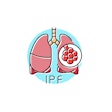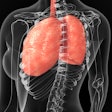
An artificial intelligence (AI) tool can improve efficiency of lung cancer screening, reducing radiologists’ workload by up to 79%. This is according to researchers from the University of Liverpool in the U.K. and the Research Institute for Diagnostic Accuracy in the Netherlands, who published a new paper in the European Journal of Cancer.
The study evaluated data from the U.K. Lung Cancer Screening Trial (UKLS) using a South Korean-developed AI program that helps read low-dose computed topography (LDCT) scans. The research team reported that the tool can accurately eliminate negative scans even among high-risk individuals. This automated effort can help streamline the testing process and give time back to radiologists who can focus their time and expertise on cases that require further analysis.
“Implementing low-dose CT screening for lung cancer is highly beneficial, but it comes with logistical and financial challenges,” said lead author John Field, PhD, professor of molecular oncology at the University of Liverpool and chief investigator of the UKLS, in a news release. “Our research suggests that AI could play a crucial role in making screening programs more efficient while maintaining diagnostic confidence.”
A remarkable result of the study was all LDCT scans flagged by the AI-driven program were confirmed positive for lung cancer. This finding validates accuracy and minimizes manual assessment when not warranted.
“This is the first chest AI validation study performed in a real-world consecutive lung cancer screening program, with histological proven outcomes of lung cancer and a more than five-year follow-up for disease free survival,” said co-lead author Matthijs Oudkerk, MD, PhD, MSc, professor emeritus of radiology at the University of Groningen, Netherlands, and chief scientific officer of the Research Institute for Diagnostic Accuracy. “Therefore, [it is] a milestone for further AI validation in terms of methodology and accuracy with results that can be translated to medical implementation.”
Integrating AI tools, such as this one, into screening programs has transformative potential to reduce costs and optimize health care resources and workload. The research team recommends additional studies to help refine the use of AI models.























